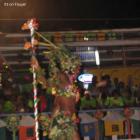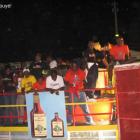Opinion Choice Origin Never Miss Kan-aval
Se sa wou vle; Pa gen pwoblèm menn konfwè'm. Mwen espewe ou satisfè, e an pil lot tou.Mwen apwesie couraj mizisien.
Mwen renmen PWOBLEM ak LAWI-a-CHO (tèm).
Mwen poko tande mizik.
E pi mwen mande DVD the Cross pa Lamarre.
Kote mwen ka twouve li.
Male na pale yon lot fwa
Years ago, the Followers of the Catholic Church in Italy started the tradition of holding a wild costume festival right before the first day of Lent. Because Catholics are not supposed to eat meat during Lent, they called their festival, carnevale, which means to put away the meat.
Carnival is celebrated two days in the season of Lent.However, as these became more oppressed, the only permissible time was when the aristocracy was engaged in their own debauchery tied to the Roman Catholic.
In many parts of the world, where Catholic Europeans set up colonies and entered into the slave trade, It took root. as so-called Mardi Gras. In Haiti, it had its roots, The tradition caught on quickly, and fancy balls were held where the wealthy planters put on masks, and beautiful dresses and danced long into the night.The use of masks had special meaning for the slaves, because masking is widely used in our rituals for the dead. Obviously banned from the masked, the slaves would hold their own little rituals and folklore, but also imitating their masters’ behavior.When the use of drums and Voodoo religious practices had been outlawed, the slaves found novel ways to pass on their heritage.
It then, probably grew with influences from the slaves who added song, music, dance as well as exuberance to transform it. Actually, the tradition of Carnaval (Mardi Gras) pre-dates Christianity itself, having roots in ancient Greek rituals honoring Dionysus, god of wine and revelry.The Romans, continued the tradition in their rituals celebrations later combined with pagan rituals For me, in Haiti, Carnaval should be a reminder to learn more about ourselves by accepting and understanding each other as human, because in it, there is no discrimination.
As every year, Gros-Morne bouk mwen (Artibonite) or Port-au-Prince.Carnaval is a beautiful example of how it can unite us.For in this small nation, the traditions have come together; to develop stronger friendships and greater respect It offers all of us a dynamic tool for self-expression and for a brief three days each year, the whole country forgets their differences, pain, suffering, misery, while under colonial rule..Sad and brutal!It became a way to express oneself as individuals, as well as traditions.
Today, Carnival in Haiti should be the togetherness, a tool to seek out our roots, to develop new forms of looking others, and finally to unite us, discover what we all have in common.
Its power and creativity can transform lives.Let us join hands not only for three days and dance â€�"KONPAâ€,in what we all should defend against Neoliberalism: Haiti.

 NaLove feat Dj Carlo Kanaval 2017 - Gade Anba
NaLove feat Dj Carlo Kanaval 2017 - Gade Anba  KAI Mikaben feat. Atys Panch official kanaval 2018 video - Chimi Chimi
KAI Mikaben feat. Atys Panch official kanaval 2018 video - Chimi Chimi  Kanaval 2017 Mechanst, Vag Lavi, DJ Combo - Sak touchew avan'l genyen
Kanaval 2017 Mechanst, Vag Lavi, DJ Combo - Sak touchew avan'l genyen  Maestro & VAYB Haiti kanaval 2018 video - Van Pran Yo
Maestro & VAYB Haiti kanaval 2018 video - Van Pran Yo  Kreyol La Haiti Kanaval 2018 Video - Anlè Anlè Nèt
Kreyol La Haiti Kanaval 2018 Video - Anlè Anlè Nèt  Raram No Limit Kanaval 2017 - Ayiti Peyi Fwamou
Raram No Limit Kanaval 2017 - Ayiti Peyi Fwamou  Roody Roodboy Kanaval 2017 - M Piwo Pase w
Roody Roodboy Kanaval 2017 - M Piwo Pase w  Nou-Vo (Okyjems) Kanaval 2017 - Pèsòn Pa Epanye
Nou-Vo (Okyjems) Kanaval 2017 - Pèsòn Pa Epanye  Mardis Gras, Jacmel Haiti
Mardis Gras, Jacmel Haiti  Haitian Girl In A Carnival Costume
Haitian Girl In A Carnival Costume  Haiti Kanaval 2008 Day 2 Photo
Haiti Kanaval 2008 Day 2 Photo  Haiti Kanaval 2008 Day 2 Photo
Haiti Kanaval 2008 Day 2 Photo  Haiti Kanaval 2008, Day 3
Haiti Kanaval 2008, Day 3  Haiti Star Parade 2008
Haiti Star Parade 2008  Haiti Kanaval 2008, Day 3
Haiti Kanaval 2008, Day 3  Haiti Kanaval 2008 Day 2 Photo
Haiti Kanaval 2008 Day 2 Photo  Haiti Kanaval 2008, Day 3
Haiti Kanaval 2008, Day 3  Haiti Kanaval 2008, Day 3
Haiti Kanaval 2008, Day 3